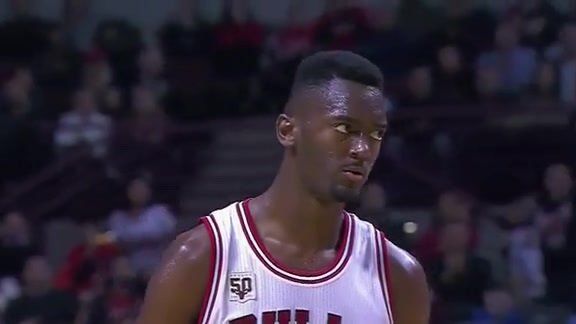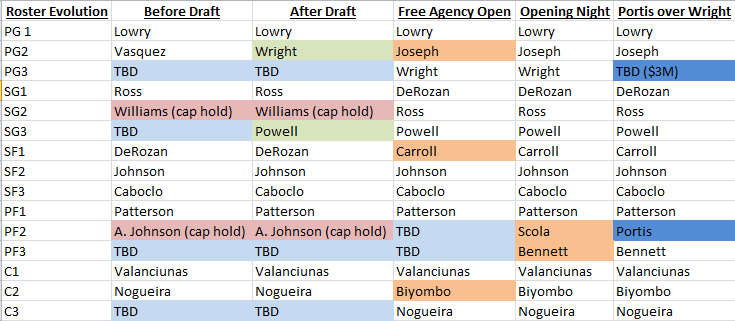So, Bobby Portis is pretty good. This isn’t exactly news, and it’s something Portis tried to warn everyone on draft night with this face:
Bobby Portis comin’ pic.twitter.com/O4FlqBdWuW
— Blake Murphy (@BlakeMurphyODC) June 25, 2015
It was, however, one of my primary thoughts watching the Toronto Raptors lose to the Chicago Bulls last night. Portis turned in a solid performance as Chicago’s first big off the bench. He finished with 12 points on 6-of-10 shooting, scoring a pair of impressive post-up buckets against Patrick Patterson, making the Raptors pay for leaving him open in the mid-range, and playing solid defense at the other end. He had nine rebounds and two assists to go with the points, and the Bulls were a plus-16 in his 27 minutes (and a minus-nine in the 21 mintues he sat).
Bobby Portis good
— Blake Murphy (@BlakeMurphyODC) December 29, 2015
There are two additional layers to Portis’ strong outing. The first is that Patterson, who played opposite him Monday and to whom Portis was occasionally compared before the draft, once tweeted that he was unimpressed with Portis’ play. Here’s doubting that’s the case any longer. (To be clear, Patterson’s tweet was from a single game and shouldn’t be taken to indicate anything other than exactly what it said at that point in time; there’s no beef to be made here.)
Not too impressed with this Bobby Portis kid.. Ain’t playing nothing like what ppl say he does. #Arkansas
— Patrick Patterson (@pdpatt) March 20, 2015
The second and more notable is that Portis was selected 22nd overall, two spots after the Raptors passed on him. This is something Michael Holian has focused on a bit with his The Undercard series (part one, part two), and Monday’s game was cause for another look back at the decision. The Raptors’ weakest position is currently power forward, and Portis is averaging 9.4 points and 6.2 rebounds in five games since Joakim Noah went down hurt for the Bulls. He might look good in the Raptors’ rotation, while Delon Wright, the player the Raptors took instead at No. 20, has played 17 minutes in total on the season.
It would be really easy to look at how Portis has played and how the Raptors have played and say the Raptors made a mistake. It would be easy, but it would be flawed and unfair. Portis has played meaningful minutes in five games, four more than Wright but still only five. Judging any pair of rookies after two months would be incredibly short-sighted, let alone ones who have played sparingly. But let’s rewind to June for just a second.
To be completely honest, I was really high on Portis. When asked about him in April, I didn’t think he’d be available at No. 20 but called said “I think (he) is going to be a really solid, if somewhat unspectacular, rotation big.” In mid-May, I still thought he wouldn’t be available but wrote, “Were he to slip, I think he’s a nice fit. He’s a power forward who does everything well, nothing poorly, and nothing at an elite level, save for his reportedly obscene motor. He’s believed to be the most sure thing to be a rotation player in the NBA, even if he may not ever sniff an All-Star Game. At No. 20, that’d be a major win.” My pre-draft scouting report on him for theScore (I was the lead on the NBA Draft while there), I called the Raptors his floor and said “there’s as close to a zero-percent chance as possible that Portis doesn’t wind up a capable rotation big man at the NBA level.”
In other words, I really liked him, and when he began to slip on draft night, I was pretty excited.
At least 3 of Portis, Grant, RHJ, Looney are going to be there for Raptors. This is good.
— Blake Murphy (@BlakeMurphyODC) June 26, 2015
As it turns out, the Raptors weren’t all that interested. Portis told Ryan Wolstat of the Toronto Sun that the Raptors didn’t even talk to him at the combine (teams can talk to a limited number of players) and weren’t in contact leading up to the draft. That seems strange just on the basis of performing due diligence on all prospects in your draft range, but there was clearly something about Portis’ profile that turned the Raptors off.
The team was high on Wright and really excited to land him, and I was more or less in favor, writing before the draft that, “There’s a very good chance he ends up being a quality rotation player, and a playoff team – perhaps one that leans heavily on analytics – will be happy to get him in the second half of the first round.” I preferred Portis or Rondae Hollis-Jefferson to Wright, but thought the Wright pick was a solid one. The Raptors also dealt Greivis Vasquez for the pick that became Norman Powell and a future first-rounder, so Wright fit a need on paper.
If that was the logic behind the pick, I have an issue with it. I’m a large proponent of taking the best player available regardless of fit for three reasons:
- Drafting the best overall talent is the best means of improving the team’s ceiling. There are exceptions where a team has a clear hole and doesn’t need ceiling, but for a first-round team without a blue-chip prospect, going for overall talent and worrying about fit later is the best way to improve the potential quality of the roster.
- Rookies don’t often contribute much in Year One, so drafting based on holes for the coming year assumes too much of the incoming pick. Wright, for example, was believed to be among the more NBA-ready (a silly term since so few rookies are actually NBA-ready), and has hardly played.
- Rosters are extremely fluid in both the short- and long-run, so drafting a player in June based on a roster that will change dramatically in July and more so by the time the rookie is able to contribute is short-sighted.
As an illustration, here’s what the Raptors roster looked like before draft night, immediately after, and now:
Maybe you like the final column best, but the Raptors couldn’t have entered the draft knowing they’d land Joseph, just like they couldn’t have entered knowing they’d land Scola. They had holes around the rotation, some cap flexibility, and would have been best-served drafting the best talent available. They also had far more information on the prospects and pending free agents than the public and surely had good reasons to make the decision they did, whether you agree with the call or not. Hopefully, they didn’t draft on short-term need and took the player they believed to be the best talent available.
If you personally think that was Portis, then seeing him succeed can rightfully sting. Again, I found myself watching Portis and thinking “what if.”
But after five good games, though, there’s no reasonable way to decry passing on him for Wright to be a mistake or a failure, or to call Wright a bust. Until 10 days ago, Portis had only totaled 26 minutes over four appearances, not dissimilar from Wright’s 17 minutes in five appearances so far. It’s two months into two rookie seasons, and Wright himself remains a viable NBA prospect who just hasn’t gotten the opportunity Portis has, one who’s shown he’s at the very least too advanced for the D-League at this stage. This might be a decision we can’t really evaluate until Wright gets a similar chance (or alternatively, if he doesn’t get that chance over a longer stretch of time).




